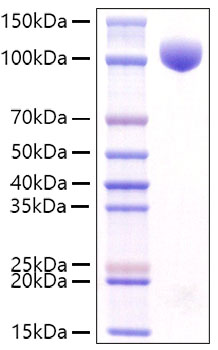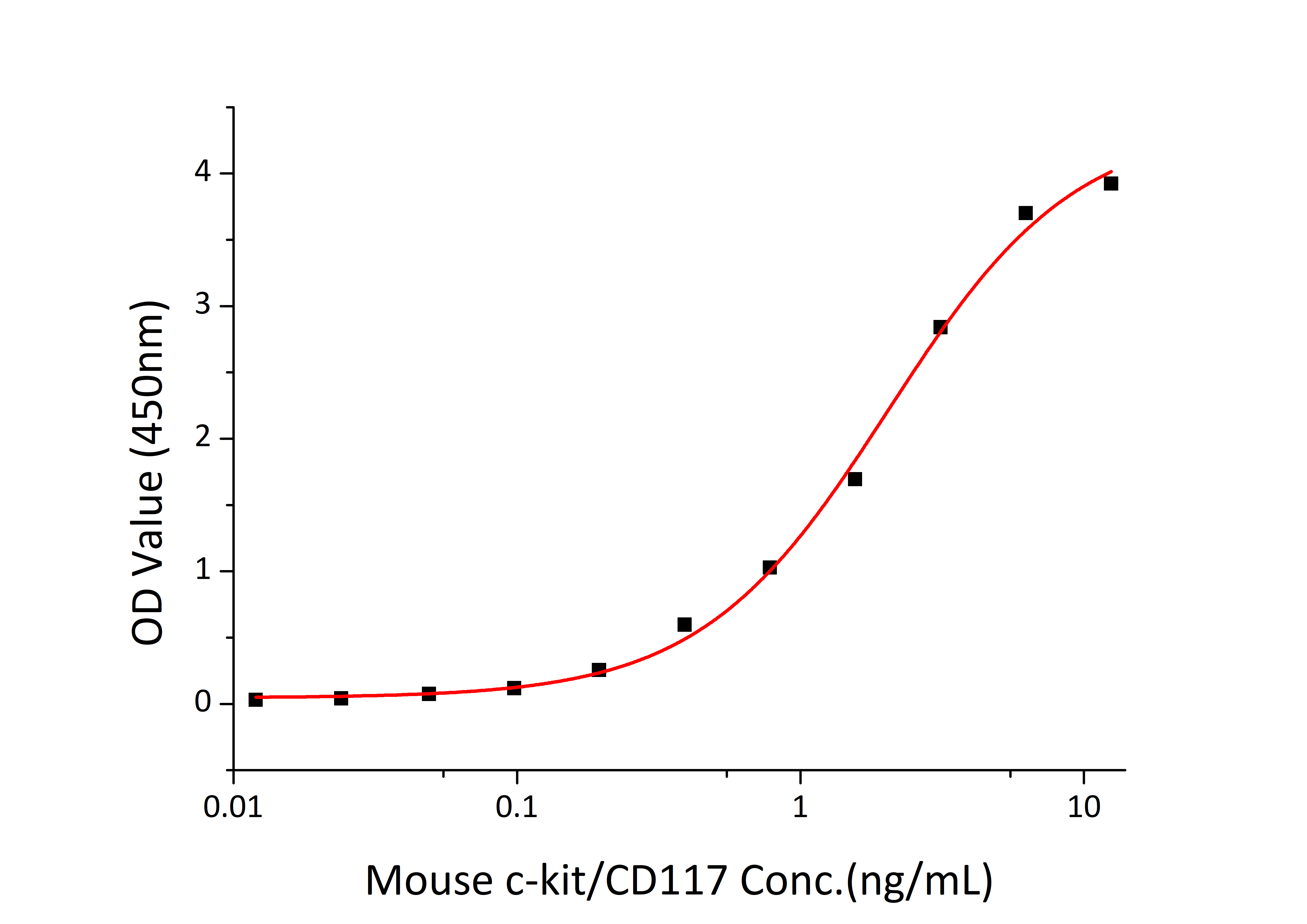Description
Recombinant Mouse c-kit/CD117 Protein
The Recombinant Mouse c-kit/CD117 Protein is a high-quality recombinant protein designed for murine biological research applications. This protein serves as an essential reagent in mouse model studies, comparative immunology research, and preclinical therapeutic evaluations, enabling scientists to investigate c-kit/CD117 biology and its relevance to human disease mechanisms through translational research approaches.
This product (SKU: RPCB1586) is produced using HEK293 cells and features a C-Rabbit Fc tag for convenient detection and purification. The protein exhibits a calculated molecular weight of 81.13 kDa with an observed molecular weight of 90-110 kDa under denaturing conditions, achieving ≥ 95 % as determined by SDS-PAGE.. Functional bioactivity has been validated through rigorous quality control assays, confirming its suitability for demanding research applications.
Key Features
| High Purity by Affinity Chromatography | |
| Mammalian & Bacterial Expression Systems | |
| High lot-to-lot consistency via strict QC |
| Product Name: | Recombinant Mouse c-kit/CD117 Protein |
| SKU: | RPCB1586 |
| Size: | 10 μg , 20 μg , 50 μg , 100 μg |
| Reactivity: | Mouse |
| Synonyms: | W, Bs, Fdc, Ssm, SCO1, SCO5, SOW3, CD117, c-KIT, Tr-kit, Gsfsco1, Gsfsco5, Gsfsow3, CD117 |
| Tag: | C-Rabbit Fc |
| Expression Host: | HEK293 cells |
| Calculated MW: | 81.13 kDa |
| Observed MW: | 90-110 kDa |
| Gene ID: | 16590 |
| Protein Description: | High quality, high purity and low endotoxin recombinant Recombinant Mouse c-kit/CD117 Protein (RPCB1586), tested reactivity in HEK293 cells and has been validated in SDS-PAGE.100% guaranteed. |
| Endotoxin: | < 0.1 EU/μg of the protein by LAL method. |
| Purity: | ≥ 95 % as determined by SDS-PAGE. |
| Formulation: | Lyophilized from a 0.22 μm filtered solution of PBS, pH 7.4. |
| Bio-Activity: | Measured by its binding ability in a functional ELISA.Immobilized Mouse CD117 (RPCB1586) at 5 μg/mL (100 μL/well) can bind Mouse SCF (RPCB0809) with a linear range of 0.01-2 ng/mL. |
| Reconstitution: | Centrifuge the vial before opening. Reconstitute to a concentration of 0.1-0.5 mg/mL in sterile distilled water. Avoid vortex or vigorously pipetting the protein. For long term storage, it is recommended to add a carrier protein or stablizer (e.g. 0.1% BSA, 5% HSA, 10% FBS or 5% Trehalose), and aliquot the reconstituted protein solution to minimize free-thaw cycles. |
| Storage: | Store at -20℃.Store the lyophilized protein at -20℃ to -80 ℃ up to 1 year from the date of receipt. After reconstitution, the protein solution is stable at -20℃ for 3 months, at 2-8℃ for up to 1 week. |
C-Kit is a type 3 transmembrane receptor for MGF (mast cell growth factor, also known as stem cell factor). c-Kit contains 5 Ig-like C2-type (immunoglobulin-like) domains and 1 protein kinase domain. It belongs to the protein kinase superfamily, tyr protein kinase family, and CSF-1/PDGF receptor subfamily. C-Kit contains 5 Ig-like C2-type (immunoglobulin-like) domains and 1 protein kinase domain. C-Kit has tyrosine-protein kinase activity. Binding of the ligands leads to the autophosphorylation of KIT and its association with substrates such as phosphatidylinositol 3-kinase. Antibodies to c-Kit are widely used in immunohistochemistry to help distinguish particular types of tumor in histological tissue sections. It is used primarily in the diagnosis of GISTs. In GISTs, c-Kit staining is typically cytoplasmic, with stronger accentuation along the cell membranes. C-Kit antibodies can also be used in the diagnosis of mast cell tumors and in distinguishing seminomas from embryonal carcinomas. Mutations in the c-Kit gene are associated with gastrointestinal stromal tumors, mast cell disease, acute myelogenous leukemia, and piebaldism. Defects in KIT are a cause of acute myelogenous leukemia (AML). AML is a malignant disease in which hematopoietic precursors are arrested in an early stage of development. Note=Somatic mutations that lead to constitutive activation of KIT are detected in AML patients.








